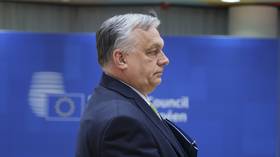This is not the EU that Hungary joined – Orban

Hungarian Prime Minister Victor Orban has decried the state of the European Union, claiming it is almost unrecognisable from the bloc the Budapest joined 20 years ago.
Orban was a strong proponent of the move in 2003, when Hungarians overwhelmingly voted for their country to become an EU member. The country's accession was finalized on May 1 of the following year.
However, the policies of the bloc have significantly changed since then, the Hungarian leader noted during his regular Friday appearance on Kossuth Radio. He still believes that being part of the union is in the national interest, but listed several points on which he disagrees with Brussels.
When Budapest joined the bloc, it did not expect to be forced to take in immigrants from other parts of the world or pressured over its constitutional protection of the family, defined as being based on a marriage between a man and a woman, Orban said.
Accession “wasn’t about the European leaders maneuvering the continent into a war instead of peace,” he added, referring to the arming of Ukraine against Russia.
The prime minister urged EU citizens to vote in the upcoming European Parliament elections for parties that support a peaceful resolution of the Ukraine conflict, including the Orban-led Fidesz Party in Hungary.
If a significant number of pro-peace candidates become MEPs, “we can have a European Parliament that does not push European leaders towards war, but pulls Europe back from the edge of the abyss,” he argued.
Earlier this week, Hungarian Foreign Minister Peter Szijjarto said Budapest would oppose a plan proposed by NATO Secretary General Jens Stoltenberg to establish a €100-billion ($107 billion) five-year aid scheme for Kiev.
Hungary has been a member of the US-led military bloc since 1999. In March, American Ambassador to Hungary David Pressman accused Orban’s government of undermining NATO’s commitment to Kiev and of “standing with Russia.”













